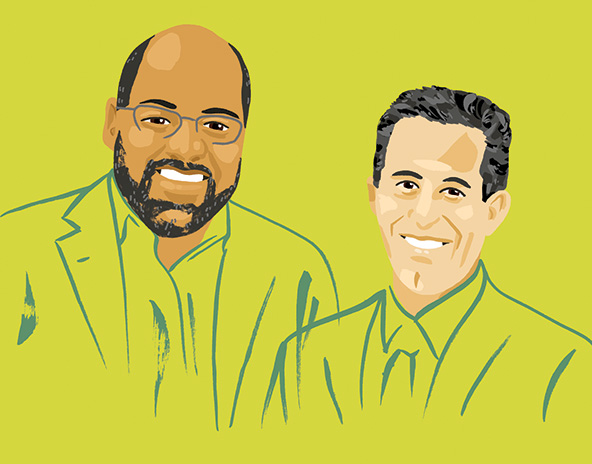
Ryan Easterly and Richard E. Besser (Illustration by Shannon May)
As president of the Robert Wood Johnson Foundation (RWJF), I have all too often observed that conversations about health equity ignore disability issues. We must shift the narrative about social justice to incorporate disability inclusion. COVID-19 has helped to illuminate the many inequities facing people with disabilities. Throughout the pandemic, many people with disabilities have contended with gaps in access to care and services, and still struggle with vaccine access. When we talk about health equity, we need to work toward a more inclusive understanding of the life experiences of people with disabilities.
Centering Disability
If the philanthropic sector is to advance social justice, diversity, equity, and inclusion, then it must recognize disability as essential to its work. This supplement offers critical perspectives and recommendations for dismantling ableism. Sponsored by the Disability & Philanthropy Forum
Serving as cochair of the Presidents’ Council on Disability Inclusion in Philanthropy has expanded my thinking about health equity. RWJF focuses on working with others to build what we call a culture of health, providing everyone in America a fair and just opportunity for health and well-being. But to achieve a culture of health, we as a society need to address the barriers so many face to health. This imperative includes focusing on advancing racial equity and removing barriers upheld by structural racism, and addressing ableism, sexism, discrimination based on sexual orientation, and classism, among other toxic legacies. And we need to be inclusive of people with disabilities.
As the nation’s largest philanthropy dedicated to health, we at RWJF are on our own learning journey around disability inclusion, and we recognize that we have a long way to go. So, I am pleased to be in conversation with Ryan Easterly, executive director of the WITH Foundation and a fellow member of the Presidents’ Council on Disability Inclusion in Philanthropy.
Richard Besser: Ryan, you describe yourself as a gay Black man with disabilities who was a former foster kid in the South, and I know that’s not your complete identity. But it’s helpful in terms of thinking about intersectionality. When you think about the term intersectionality, what does it mean to you, and how have your personal experiences shaped how you see intersectionality and the importance of racial equity and disability inclusion in the work that you do?
Ryan Easterly: Intersectionality acknowledges that individuals have multiple identities and experiences that affect how they navigate society and the forms of oppression and discrimination they may face. As someone who’s gay, Black, has disabilities both apparent and nonapparent, and who grew up in the South and spent some time in the foster care system, I’m very aware that many of the programs and policies I benefited from were not necessarily designed with my unique needs in mind. In my work in philanthropy, it helps me to always look around the table to see who is making the decisions, looking especially for those who are most marginalized, by which I am primarily referring to people of color, Black people, and women. It was only by others intentionally addressing my needs and experiences that I was able to survive and thrive. In my work, I try to do the same. Through WITH Foundation funding we promote health care that meets the unique needs of the I/DD [intellectual and developmental disabilities] community. Philanthropy often focuses on race, gender, and other dimensions of identity when addressing equity, but disability is not often addressed. I think there’s an opportunity for philanthropy to do that. It will enable philanthropy to preserve and protect the rights of people with disabilities, who represent one in every four Americans and more than one billion people worldwide. It’s an opportunity for philanthropy to ensure that everyone can achieve equity.
Besser: I was wondering if you could share—from your experience as a health-care funder and someone who funds in the disability space—what areas you focus on, why you focus on those areas, and how you see that work leading to a more inclusive society.
Easterly: We focus on promoting comprehensive health care for adults with developmental disabilities. When I say developmental disabilities, I mean when the onset of the disability generally occurs before the age of 22. We accomplish this by supporting projects and service-delivery models that are intentional and by including the perspectives of self-advocates and family advocates in the implementation of the service-delivery program. We also support cultural humility through cultural competency training for medical professionals.
Besser: What is cultural humility work?
Easterly: If you are a professional—in our case a medical professional—who is outside the disability community, there should be some level of understanding that the individual with a disability lives their experience every day. They are an expert in the experience of disability. When you’re talking to them as a professional, you are speaking to an expert. There should be a level of self-examination, cultural humility, and a culture of respect between the individual with lived experience and the medical professional to provide care in a culturally competent way.
Besser: Interesting. Thank you.
Easterly: From your perspective, what do you think it’s going to take to create a more inclusive and equitable public health system?
Besser: I think there’s a lot of work that needs to be done on that side of the house. The COVID-19 pandemic made it clear that our public health system is not meeting the needs of our nation in anything close to an equitable fashion. When you look at the impact of the pandemic and the economic crisis, people of color—Black, Indigenous, and Latinx—and people with disabilities have been hit incredibly hard. Our public health system isn’t even capturing the data and information that are necessary to really identify what the critical issues are and direct resources toward them. One area we are engaging in is looking at how to transform public health data systems to ensure that they collect information that can be broken down by race, ethnicity, gender, sexual orientation, disability, neighborhood, and income. Doing that will highlight where the greatest needs are, which makes it possible to work with communities to address those needs. There also must be a fundamental commitment by our public health systems and leaders to engage with communities.
The experts on how to address the issues that people with disabilities face are people with disabilities. If you’re not engaging directly, if you’re thinking in a room off to the side, and if you’re not recruiting people with disabilities and people who self-identify as disabled, then you’re not going to be able to meet those needs and address those profound inequities and disparities.
Easterly: I wholeheartedly agree as someone with lived experiences of disability—both apparent and nonapparent. I also find that in our work, we include people with lived experiences of disability at all levels of our organization. We have representation on our board of directors as well as representation on our staff. We also rely on a self-advocate advisory committee of adults with intellectual and developmental disabilities from across the country who advise the WITH Foundation and our board of directors. As someone with disabilities, I can tell you, no one organization or individual can know everything there is to know about the disability experience. There are things I learn, and there are ways in which the advisory committee supports an evolving understanding of disability, from which WITH benefits every day. I so appreciate the ways in which our advisory committee supports our continued learning and evolution in understanding of the disability experience.
Besser: Well, it’s one area where we have a lot of work to do as a foundation, in terms of recruiting staff and trustees with disabilities. I think until we have more staff representation of people with disabilities, we won’t be able to make the kind of progress we’d really like to see.
I know we don’t have that much longer to talk, but could you name one success story from your work helping people with disabilities—one thing that brings you joy and helps improve the lives of the people you work to serve?
Easterly: That is a difficult question, to be frank. I do want to take a moment to encourage individuals and organizations to look at our list of grantees on our website and learn more about these important efforts to help support comprehensive health care for adults with developmental disabilities. Personally, as executive director, I am proud to know that the WITH Foundation doesn’t ask anything of our grantees that we’re not asking of ourselves. We support our grantees in their intentional efforts to include the perspectives of individuals with disabilities, not only as beneficiaries of care, but also as leaders and experts in the implementation of that care. So often as funders we ask a lot of questions of the organizations we support, but don’t often ask those same questions of ourselves.
Besser: Ryan, is there any call to action you would have for those of us who work in philanthropy?
Easterly: I would like my peers in philanthropy and other sectors to hear me when I say that if you’re considering being more intentional about including disability in your work and about being inclusive in your work, then start that journey of disability inclusion now. The lives of people with disabilities depend on it. Also, if you happen to be a funder who has said, “We don’t do disability,” know that from my perspective, that is discrimination. You are actively making it harder for people with disabilities, myself included, to achieve their own goals and live fully fulfilled lives. So, please start this journey. Don’t wait until you understand everything about disability to start on the journey. There are disability organizations in your community and resources at the Disability & Philanthropy Forum that will support you in this learning. There is no perfect time to start—just start it now. And if you happen to be a funder who is already somewhat experienced in providing disability-inclusive funding, then work with your grantees and partners. Help support them in becoming more intentional and addressing issues related to race, ethnicity, and gender identity. There’s much more work that must be done to support disability organizations and to intentionally address racism. I hope you all will join me on the journey of disability inclusion because we need you.
Read more stories by Richard E. Besser & Ryan Easterly.









